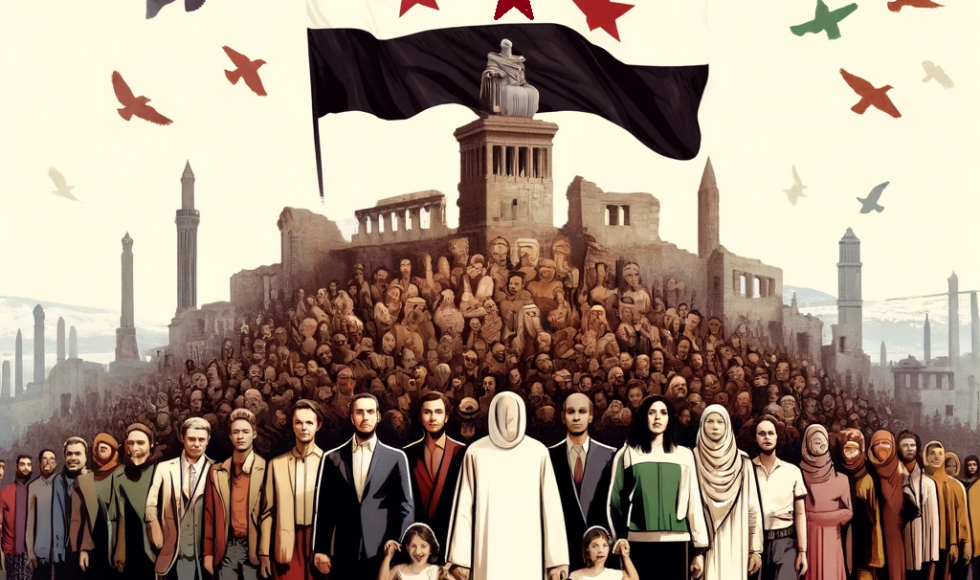Ensuring Minority Rights in Syria’s Future Constitution
With the downfall of the Assad regime, the protection of minority rights emerges as a fundamental pillar for rebuilding Syria’s fractured social fabric. Syria’s diverse ethnic, religious, and cultural composition is a source of strength and innovation. However, years of systemic marginalization and discrimination under the previous regime have deepened societal divides, necessitating a constitutional framework that guarantees justice, equality, and an active role for all citizens in shaping the country’s future.
The Importance of Minority Rights in Syria
Syria’s rich cultural and ethnic diversity has historically fostered coexistence among groups such as Kurds, Armenians, Assyrians, Turkmens, Druze, Alawites, Christians, and others alongside the Sunni Arab majority. However, decades of state-driven discriminatory policies have weakened this social fabric, increasing the risk of further divisions and instability.
In the post-regime era, safeguarding minority rights is not just a moral or legal obligation but a prerequisite for lasting peace and political stability. When minorities are granted equal rights, political and social participation is strengthened, enhancing the legitimacy of the state and reducing the risk of future conflicts. Protecting these rights also addresses the root causes of exclusion and discrimination, preventing sectarian or ethnic violence and fostering peaceful coexistence.
Furthermore, Syria’s commitment to minority rights aligns with international human rights conventions, enhancing its global standing and facilitating international cooperation. Ultimately, ensuring minority rights transforms diversity from a source of division into a pillar of strength and unity, laying the foundation for a just and equal Syria where all communities coexist in mutual respect and national integration.
Challenges in Protecting Minority Rights
Despite broad recognition of the importance of minority rights in Syria, significant challenges remain. One of the most pressing is the legacy of sectarian politics, which was exploited by the previous regime to consolidate power, fostering deep mistrust among communities. Overcoming this requires serious efforts toward national reconciliation and a unifying national identity that prioritizes citizenship over sectarian or ethnic affiliations.
Additionally, the lack of consensus on the definition of “minority” in the Syrian context poses another challenge. While Kurdish communities seek recognition of their ethnic identity, including language and cultural rights, religious minorities emphasize protections against discrimination and the right to freely practice their faith. Balancing these demands while preserving national unity and sovereignty requires innovative solutions and inclusive dialogue.
Addressing these challenges demands strong political will, a comprehensive national dialogue, and a clear vision that embraces diversity as a cornerstone of Syria’s future.
Key Constitutional Principles for Minority Protection
To ensure effective protection of minority rights in Syria’s future constitution, it must be built upon solid constitutional principles that reflect a genuine commitment to justice and equality. These principles include:
- Equality Before the Law: The constitution must explicitly guarantee equal rights for all citizens, regardless of ethnicity, religion, or cultural background. This principle should be embedded in the constitutional text and preamble to reaffirm the state’s commitment to preventing marginalization.
- Prohibition of Discrimination: The constitution should include clear provisions prohibiting discrimination based on ethnicity, religion, language, or gender. These provisions must be backed by legal mechanisms to enforce anti-discrimination laws and hold violators accountable, fostering an environment of fairness and inclusion.
- Cultural and Linguistic Rights: Recognizing Syria’s linguistic and cultural diversity is crucial. The constitution should safeguard the right of all communities to preserve their cultural heritage and language while supporting institutions that promote their unique identities.
- Rule of Law and Judicial Independence: Protecting all citizens, including minorities, requires an independent judiciary. The constitution must establish mechanisms to uphold judicial independence and create human rights institutions capable of monitoring and addressing violations effectively.
- Reconciliation and Transitional Justice: Addressing the legacy of conflict and sectarian divisions demands constitutional provisions for truth and reconciliation commissions, reparations programs, and initiatives that promote national unity. These measures will help rebuild trust among Syria’s diverse communities.
The Role of the International Community
At this critical juncture, the international community can play a supportive role by providing technical expertise and assistance to ensure that best practices are incorporated into the constitutional framework. However, the drafting of Syria’s new constitution must remain a Syrian-led process, free from external agendas that could undermine national consensus or sovereignty.
Despite the profound challenges facing the country—from deep social divisions to complex foreign interventions—Syria has the potential to overcome its crisis. Achieving this requires genuine political will, strategic international support tailored to Syria’s unique circumstances, and an inclusive national dialogue that ensures all voices are heard.
By adopting these measures, Syria can transform from a nation fractured by conflict into one that celebrates its diversity, guarantees the rights of all its citizens, and establishes a foundation for lasting stability and prosperity. This is not an unattainable dream but a necessary path toward a safer and more just future for all Syrians.
Read the post in Arabic HERE
Ibraheem Jabr is a seasoned legal professional with extensive expertise in international law, human rights, and commercial legal support. Based in Eindhoven, Netherlands,Ibraheem is the Founder and Legal Counsel at Legal Bridge, where they provide expert legal advice to EU-based government agencies and law firms navigating the complex legal landscape of the Middle East and North Africa (MENA) region.



